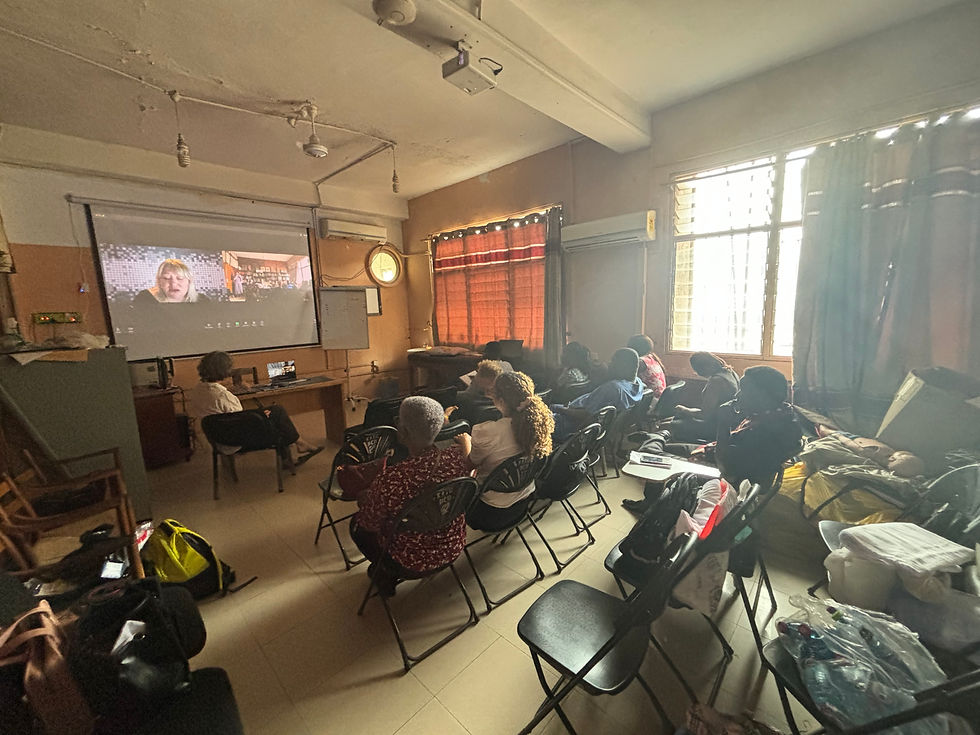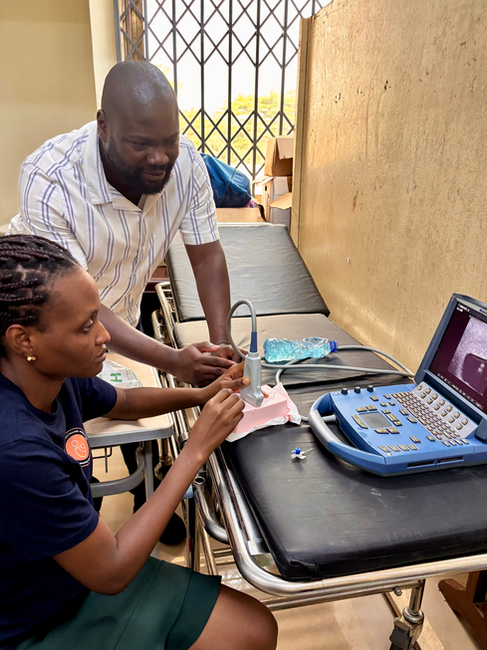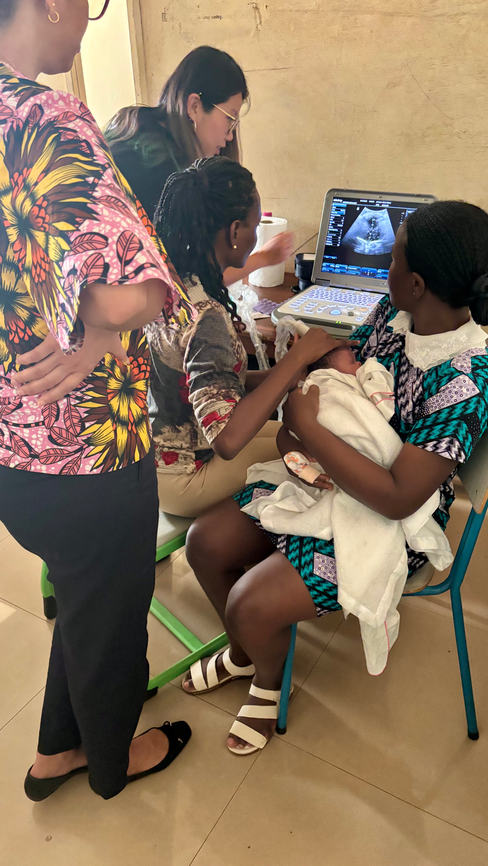New research: How POCUS is changing patient care in Ghana
- Worldwide Radiology

- Oct 7, 2025
- 4 min read
Patient access to medical imaging services in low and middle income countries is often limited. Due to high cost, infrastructure challenges, limited availability of services and workforce shortages. However, point of care ultrasound (POCUS), a low-cost, portable ultrasound test that can be applied outside medical imaging departments by health workers other than imaging specialists, offers a practical alternative for many patients.
A recent research study undertaken by us and our partners at the University of Salford in the UK and the University of Health and Allied Sciences in Ghana, explored how POCUS skills, obtained through our POCUS training programme in Ghana are being applied by clinicians in their everyday practice, and what needs to happen next to expand impact.
Read the full open access paper in BMC Medical Education, here:
The video below introduces our POCUS training course in Ho Teaching Hospital in Ghana.
Why this study matters
POCUS has become increasingly popular in many parts of the world as a tool for frontline healthcare workers. Yet, while the technology holds promise, there is still limited evidence about how it is actually used in daily clinical care in Ghana.
“We wanted to learn about the impact that our new POCUS training programme in Ghana was having on the day-to-day work of the doctors who were using these new POCUS skills.” – Dr Anna Pathak, WWR volunteer and study lead
This study was designed to help fill that gap. It looks at how WWR’s POCUS training programme in Ghana affects doctors’ diagnostic confidence, their clinical decision-making, as well as what helps or hinders its successful application. It also highlights the social, cultural, and financial realities that shape how POCUS is taken up and used on the ground.
What the research found
Doctors who completed the POCUS training reported that it quickly became part of their routine clinical assessment.
“All the doctors started using POCUS as part of their clinical examination, alongside things like taking a patient’s blood pressure or pulse.” – Dr Liz Joekes, WWR POCUS Programme lead and study co-supervisor
They valued being able to scan patients at the bedside, especially in urgent or unclear situations. Many also used POCUS to monitor patients over time.
“It also helps you track patients’ progress. For example, if you have a pleural effusion that you have drained, you can come and rescan to see whether there is still enough or if it is totally gone.” – Study participant
A key finding was that nearly 40% of patients scanned would not have been able to afford or access any other diagnostic test, imaging or laboratory.
“To me this was a really sobering statistic, but it also reinforced the need to enable more healthcare staff with good quality POCUS skills.” – Dr Liz Joekes
The study also found that:
Most doctors used their POCUS skills regularly and found the exams relatively straightforward to perform.
The greatest benefits reported were faster diagnosis, better decision-making, and improved ability to monitor patient progress.
Mentorship was highlighted as being a really important way of further developing and then maintaining the quality of their POCUS skills.
Barriers to implementation included limited availability of functional equipment, lack of time and funds for training.
A few healthcare workers have shared their experience:
“Someone donated [a cart-based] ultrasound machine…. It was not very good quality, but it was better than not having anything. It had a curvilinear probe…it wouldn’t really work very well for some of the patients because the penetrance was poor”.
“If we could make [POCUS training] more affordable for the ordinary Ghanaian doctor then we could have more people trained.”
Context matters
A key strength of the study is the consideration of the wider context in which the new POCUS skills are being applied.
“This paper goes beyond describing whether the POCUS training and intervention worked or not. It highlights the social, cultural and economic factors, for example available resources and hospital cultures that affected implementation.” – Felix Limbani, senior social scientist
What’s needed to scale POCUS in Ghana
To expand the training and use of POCUS more widely in Ghana and similar settings, the study identifies some key priorities:
1 - Equipment access and maintenance
Many hospitals have limited ultrasound machines and financial resources are needed to purchase and maintain them.
2 - Protected time for training
Clinicians are often stretched thin, and taking time away for training can impact service delivery.
“They are already very short-staffed and taking leave for training puts extra strain on the patient care they need to deliver.” – Dr Liz Joekes
3 - Mentorship and follow-up
Ongoing support helps ensure skills are retained and used appropriately.
4 - Investment in infrastructure
Blended learning that includes online components is a valuable approach but only works when internet connectivity is reliable.
“We sometimes underestimate the importance of investing in internet connectivity to make online and remote learning actually work well.” – Angela Booth, University of Salford and POCUS Module Lead


Plans are in place to continue the training programme with strong interest from future participants , but this will depend on continued availability of funding.
The next phase of research will aim to measure the impact of POCUS on clinical outcomes, patient experience, and cost-effectiveness over time.
“POCUS is offering patients faster, more affordable and better diagnosis. These benefits drive the need for further training with strong communities of practice and for solutions to current barriers of equipment availability, training costs and lack of quality assurance mechanisms.” – Prof Yaw Asante Awuku, POCUS Programme Lead Partner, Ghana

Want to support this work?
We welcome interest from health workers, educators, and supporters who want to get involved in sustainable medical imaging training. You can express interest in volunteering or collaboration via the Worldwide Radiology website. Sharing the research, raising awareness, and helping fund future training are all vital to keeping this work going.
This paper is part of a growing body of evidence showing that with the right support, POCUS can strengthen healthcare systems where imaging access is limited, not just through equipment, but through people, training, and long-term partnership.
.png)











